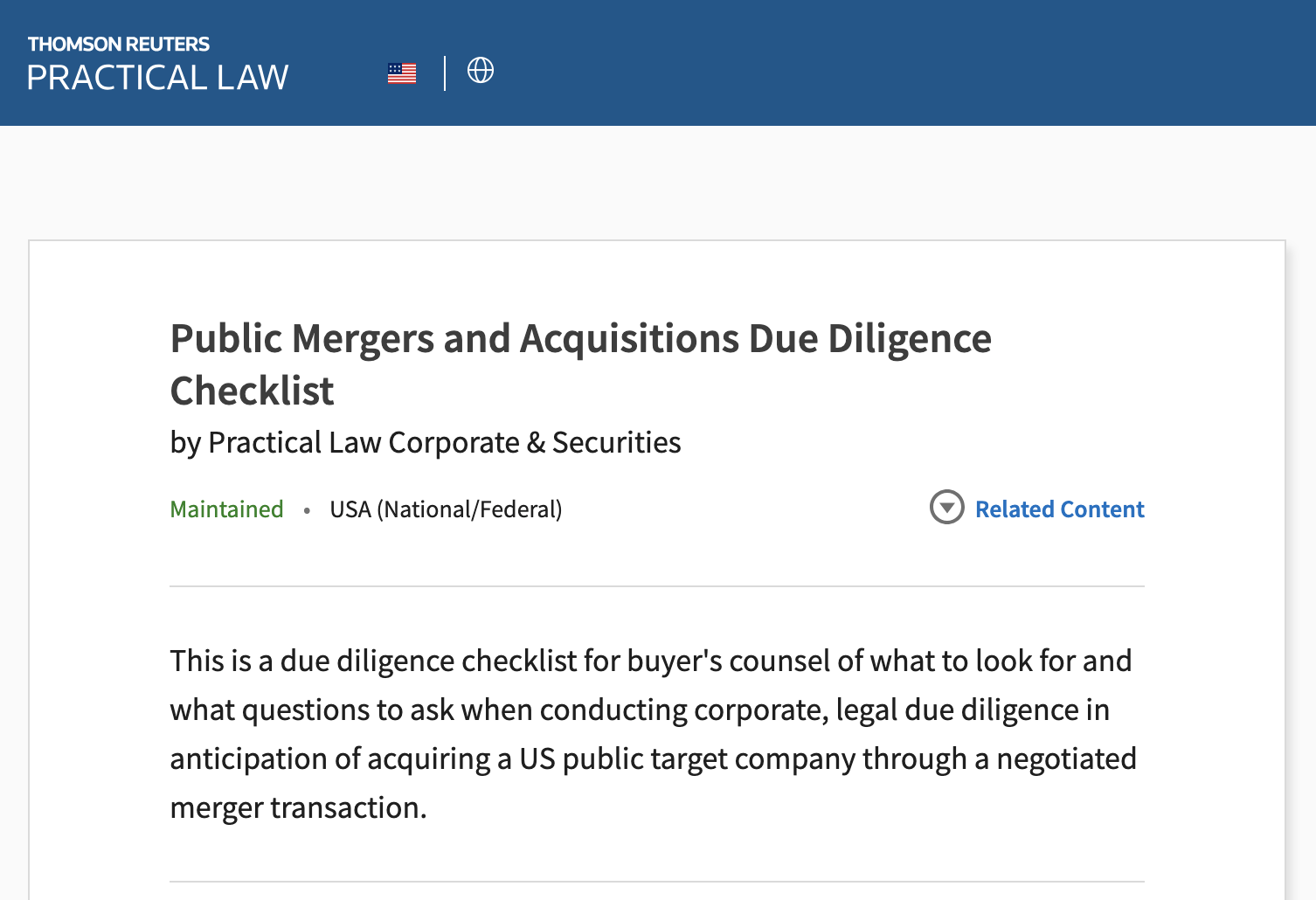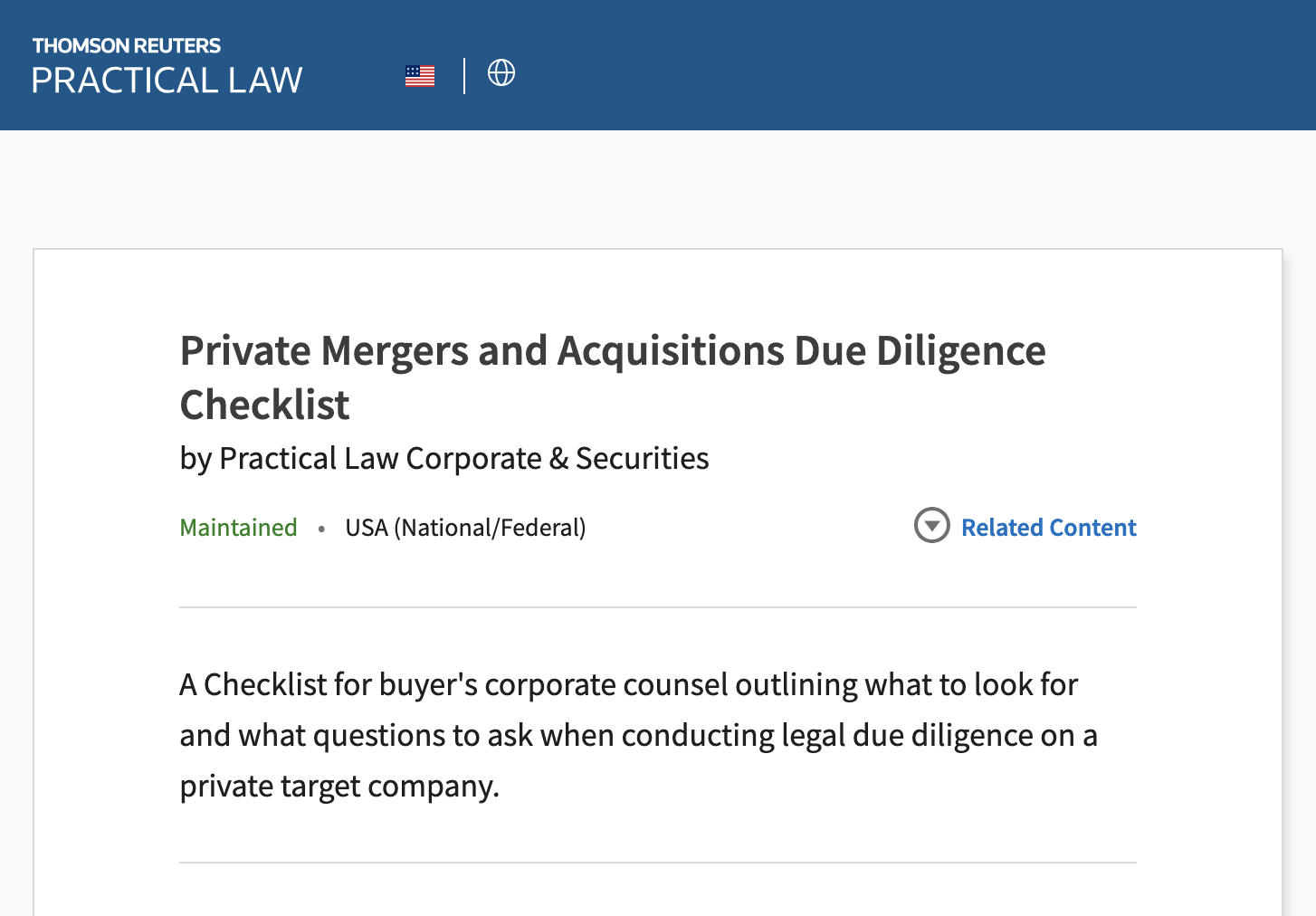M&A due diligence checklist for buyer's counsel
You’ve been assigned a major task—your firm has put you in charge of conducting due diligence for an upcoming merger. Your work will be vital to the deal’s success, as well as to your firm’s relationship with its client. Digging into a potential acquisition, and spotting any red flags in the company’s operations is an essential job for a lawyer.
However, the amount of work that due diligence entails can make a junior attorney unsure about where to begin. The process may seem overwhelming. First things first: you need an M&A due diligence checklist.
Don’t attempt to do eight things at once—without a diligence process structure, this means you could go astray in eight different ways. With a checklist as your roadmap, you will know what you need to look for, how much time you have to find it, and who to send it to. Your job becomes far more manageable.
Jump to ↓
How do I make an M&A due diligence checklist?
Comprehensive M&A due diligence checklist steps
This checklist covers all the major categories of steps needed for both public and private M&A due diligence.
| ✓ | Handle preliminary matters |
| ✓ | Assemble the due diligence team |
| ✓ | Submit the due diligence request |
| ✓ | Distribute and organize materials |
| ✓ | Communicate and report due diligence findings |
| ✓ | Review key sources of information |
| ✓ | Determine whether specialist review is necessary |
Each step is further explained below along with some suggestions and guidelines for making checklists, for both public M&A and private M&A deals.
How do I make an M&A due diligence checklist?
An M&A due diligence checklist should start with the basic requirements of any buyer, but expand to incorporate information pertinent to the deal at hand. A good M&A diligence checklist is adaptive. It takes into account the nature of the merging entities, their management and ownership structures, their marketplaces and their histories.
Making a checklist is the best way to tackle a complex, detail-oriented, and time-sensitive task to ensure more efficient and faster M&A deals.
- You need to know what diligence will entail
- Who the key players in the process are
- What the timeframe is
- What types of documents are essential
- and so much more
There’s something unique about every deal. It could be the nature of the seller’s business, or the complexity of its intellectual property holdings. The deal’s structure may be novel, or a challenge to execute. Regulators may play a determining role in whether the deal gets done.
Consider the two checklists below, which advise on how to conduct due diligence for public and private deals, to be a starting point. They are guidelines to effectively run diligence, giving tips on how to assess, organize, and present all of the resources that you collect during the process.
Use them to ensure that you’re asking the right questions and finding the essential information your deal team needs. Keep in regular contact with senior members of the deal team to ensure that your checklist addresses all issues involved in the transaction.

Related blog
How to organize and conduct a legal due diligence review for US public and private deals
View blog ↗What should go into an M&A due diligence checklist for public mergers and acquisitions?
A public deal has many moving parts. Shareholder considerations, financial reporting obligations, equity market volatility, and other outside factors can potentially influence the deal’s progress.
Because the company is public, it will have virtual piles of information for a diligence team to go through—securities filings, quarterly reports, regulatory requirements. Lawyers will need to take a host of factors into account while still preparing for surprises along the way, even if it looks like a smooth transaction on paper.
| Step | Key points | Questions |
|---|---|---|
| Handle preliminary matters | Before starting due diligence, answer some key preliminary questions. Do this before you begin talking with a client. You will be able to better craft your diligence review once you have the foundational information in place. | What type of merger is it? What’s the nature of the merger? What type of business are you analyzing? |
| Assemble the due diligence team | Before diligence begins, get your diligence team in place. At your law firm, are all necessary internal specialists available, time-wise, to do the work? | Is local counsel needed? Will you need outside specialists? Who is the contact person at the other company’s law firm for due diligence? |
| Submit the due diligence request | Be sure that your team is looking for the most relevant pieces to help senior lawyers conducting the negotiations. | What is the target’s management or ownership structure? What are possible impediments to closing the deal? |
| Distribute and organize materials | You want the right people involved in the deal to get the right materials they need at the right time, in an easily accessible and searchable format. | How best to organize materials? Are you aware of your firm’s record retention policy? If due diligence materials are in a virtual data room, do all relevant members of the deal team have access? |
| Communicate and report due diligence findings | A paralegal can often help with this process using legal business management platform that integrates with AI tools. | What are the resources you can use at your firm? Will you need to create a due diligence index from the data site? |
| Review key sources of information | In a public deal, the target’s SEC filings are critical to diligence review. You will need to perform diligence on the target’s protocols and procedures in connection with SOX. | Has the target company restated or made significant corrections to filings? What is the process for the target’s CEO and CFO SOX certifications? |
| Determine whether specialist review is necessary | Even though specialist documents get reviewed by other lawyers, a lawyer fluent in the particular area will be necessary to ensure this aspect of diligence is fully covered. | For example, for real estate specialists, queries will include: Does the target own or lease its properties? Will the merger trigger any change of control or assignment provisions in the lease agreement? |
What should go into an M&A due diligence checklist for private mergers and acquisitions?
When conducting the due diligence of a private company acquisition, your core questions are essentially the same as those for a public merger. The difference is in the details, or, more specifically, the possible lack of them.
In many cases, a private company will not have as much listed documentation to go through as a publicly-owned one, which makes diligence a challenge. It may entail conducting more face-to-face interviews with company officials to acquire critical information, or visiting the target company to go through their accounts and assess their holdings.
| Step | Key points | Questions |
|---|---|---|
| Define the due diligence task | As with public company due diligence, know what your client fundamentally needs such as budget, scope, and deadlines. | Will outside consultants be needed? |
| Assemble the due diligence team | The due diligence team’s make-up depends on transaction specifics, but usually includes: legal, business, accounting, and tax specialists. |
Who will be the point person to coordinate the process? |
| Submit the due diligence request | A due diligence request lists questions and makes requests for documents, organized by topic. The initial request is usually supplemented by further ones once negotiations proceed and the buyer learns more about the target. | Is your due diligence request too generic or broad? |
| Get access to sources of information | In a private deal, the diligence team often lacks such resources as the EDGAR system to track and analyze the target company’s financial statements. They instead will need access to the target company’s privately-held financials. | Is the private company wary of sharing what it considers trade secrets about its operations? |
| Distribute and organize materials | Especially if the parties are competitors, a private seller may impose substantial restrictions on the dissemination of materials because they’re wary of sharing information before the deal is consummated. | Any procedures to limit access to materials? |
| Materials and common issues to watch out for | For a private company, ownership documents will be of paramount interest during diligence. | Who owns equity in the target business? Will equity-holder votes or consents be required in connection with approving the deal? Are there any restrictions on the transfer of equity? |
| Delegate specialist reviews | As with public deals, a portion of the due diligence review will likely require legal specialists and outside consultants | Is there a need for review by an IP attorney? |











